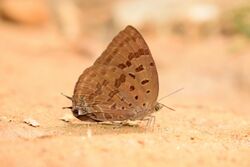Biology:Arhopala silhetensis
| Sylhet oakblue | |
|---|---|

| |
| Scientific classification | |
| Domain: | Eukaryota |
| Kingdom: | Animalia |
| Phylum: | Arthropoda |
| Class: | Insecta |
| Order: | Lepidoptera |
| Family: | Lycaenidae |
| Genus: | Arhopala |
| Species: | A. silhetensis
|
| Binomial name | |
| Arhopala silhetensis (Hewitson, 1862)
| |
| Synonyms | |
| |
Arhopala silhetensis, the Sylhet oakblue, (sometimes placed in Amblypodia)[1] is a small butterfly found in India that belongs to the lycaenids or blues family. The species was first described by William Chapman Hewitson in 1862.
Description
Male forewing 25 mm., bright shining blue, border 1 mm.Female lighter blue, border 4 mm. Below somewhat ochreous brown, no purple wash. Above very similar to Arhopala malayica [now subspecies upper surface lilac-blue colour margined with black, the under-surface exhibits all the spots dark and distinct.The female has a broad black costal margin and distal margin], but easily discernible by the reduction of the marking beneath, where the spots in the forewing are almost obsolete and the submarginal band is only represented by a nebulous stripe]. The female is not unlike that of Arhopala eumolphus, but easily distinguishable by the blue colouring above and the less lustrous under surface. [2] [3]
Subspecies
- A. s. silhetensis Sikkim, Assam, Manipur, Burma, Mergui, Thailand, ?Indo China
- A. s. adorea ‘de Nicéville, 1890 Peninsular Malaya, Singapore, Sumatra, Borneo
- A. s. fundania Fruhstorfer, 1914 Java
- A. s. malayica Bethune-Baker, 1903 Philippines, Java?
- A. s. philippina (Hayashi, 1981)Philippines (Mindanao)
Range in India
The butterfly occurs in India from Sikkim onto north Myanmar, and, from Karens to south Myanmar. [4]
Status
The species is considered rare.[4]
See also
Cited references
- ↑ Beccaloni, G.; Scoble, M.; Kitching, I. et al., eds (2003). "Amblypodia silhetensis". The Global Lepidoptera Names Index. Natural History Museum. https://www.nhm.ac.uk/our-science/data/lepindex/detail/?taxonno=195037.
- ↑ Seitz , A. Band 9: Abt. 2, Die exotischen Großschmetterlinge, Die indo-australischen Tagfalter, 1927, 1197 Seiten 177 Tafeln
 This article incorporates text from this source, which is in the public domain.
This article incorporates text from this source, which is in the public domain.
- ↑ D'Abrera, B. 1986. Butterflies of the Oriental Region, Part III Lycaenidae & Riodinidae: pp. 536–672. Hill House, Melbourne.
- ↑ 4.0 4.1 Evans, W. H. (1932). The Identification of Indian Butterflies (2nd ed.). Mumbai, India: Bombay Natural History Society. p. 260, ser no H49.21.
References
- Beccaloni, George; Scoble, Malcolm; Kitching, Ian; Simonsen, Thomas; Robinson, Gaden; Pitkin, Brian; Hine, Adrian; Lyal, Chris. "The Global Lepidoptera Names Index (LepIndex)". Natural History Museum, London. https://www.nhm.ac.uk/our-science/data/lepindex/. Retrieved 2016-10-15.
- Haribal, Meena (1992). The Butterflies of Sikkim Himalaya and Their Natural History. Gangtok, Sikkim, India: Sikkim Nature Conservation Foundation.
- Wynter-Blyth, Mark Alexander (1957). Butterflies of the Indian Region. Bombay, India: Bombay Natural History Society. ISBN 978-8170192329. https://books.google.com/books?id=yEkgAQAAMAAJ.
External links
- Takanami, Yusuke; Seki, Yasuo (2001). "Genus Arhopala (Plate C)". http://www.asahi-net.or.jp/~EY4Y-TKNM/Arhopala-Phil/Arhopala-C.html. With images.
Wikidata ☰ Q4790070 entry
 |


